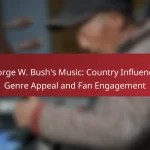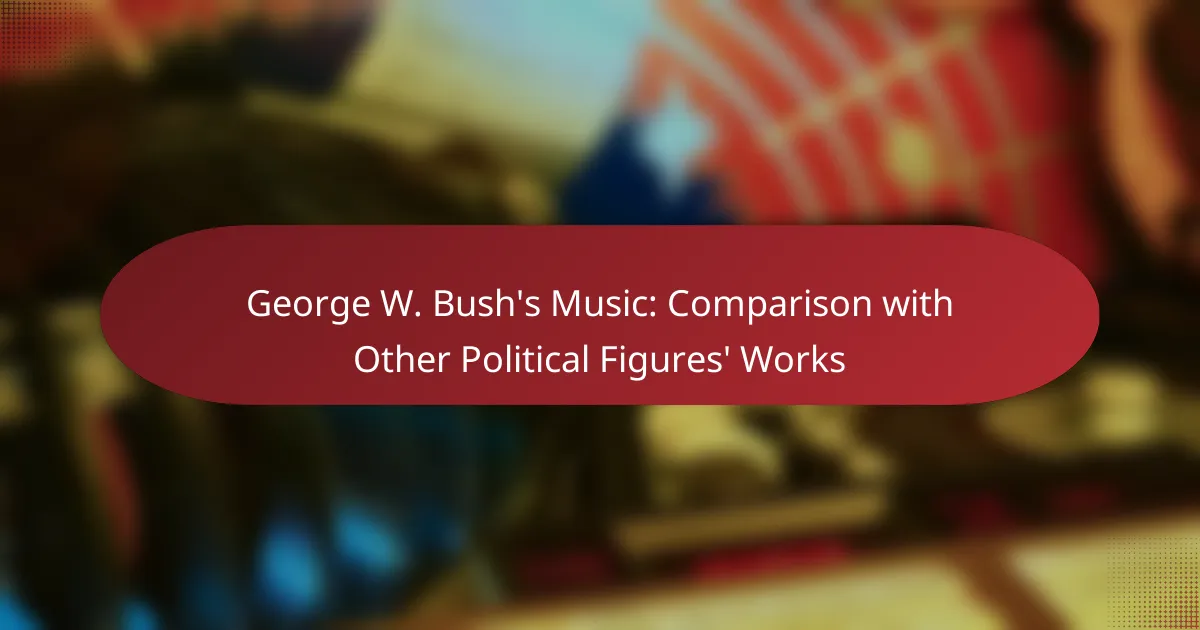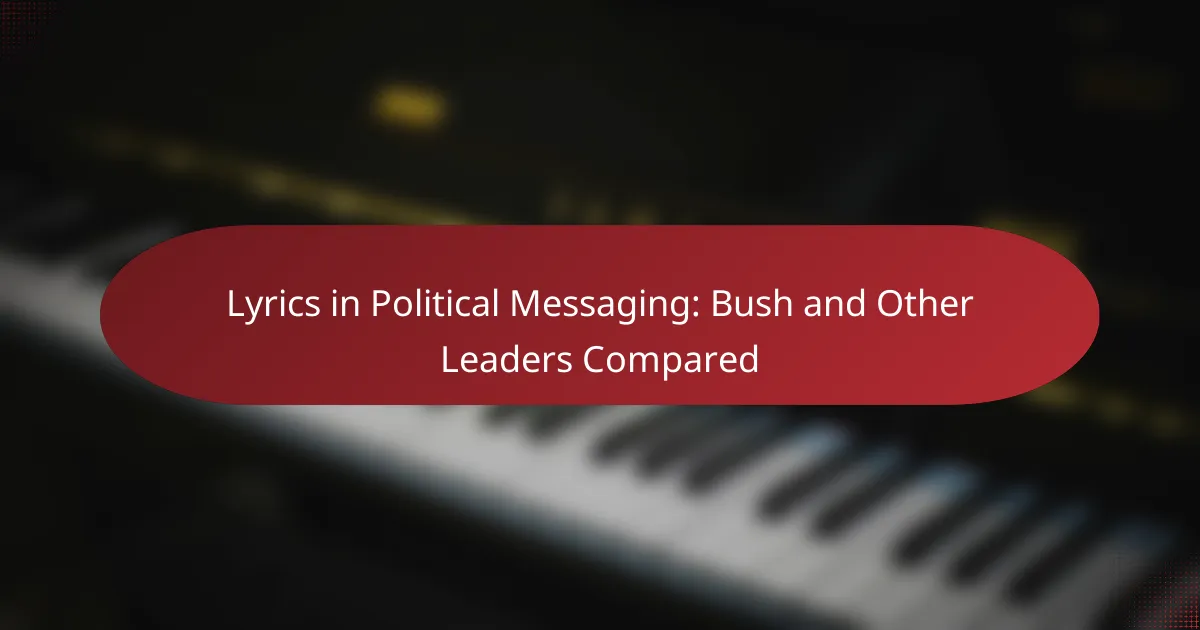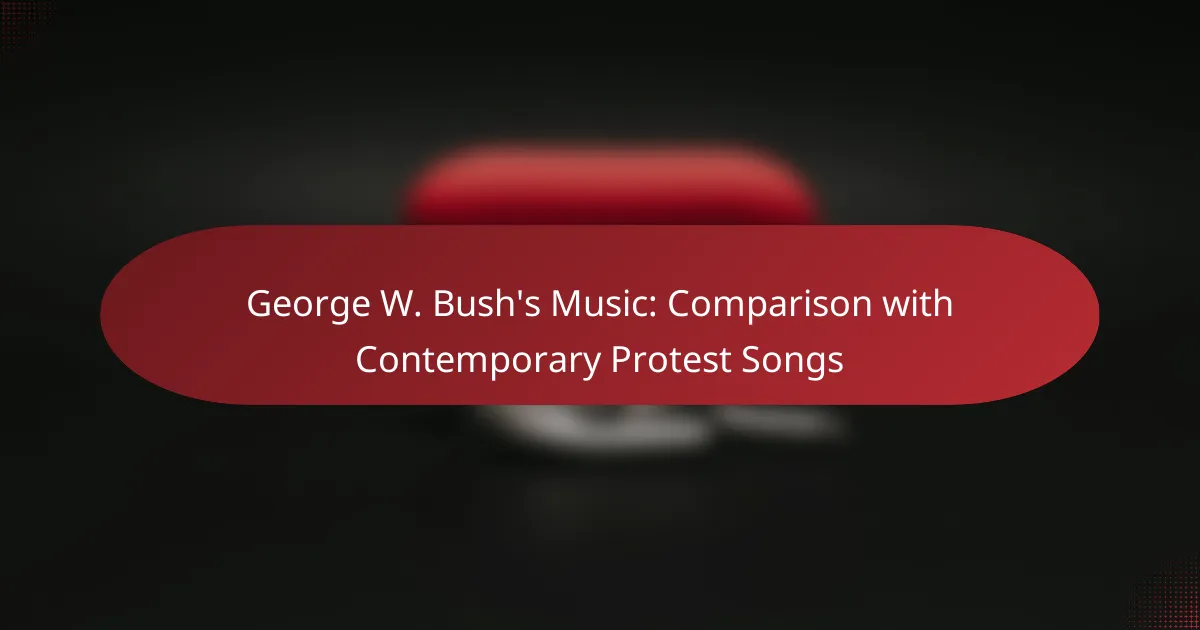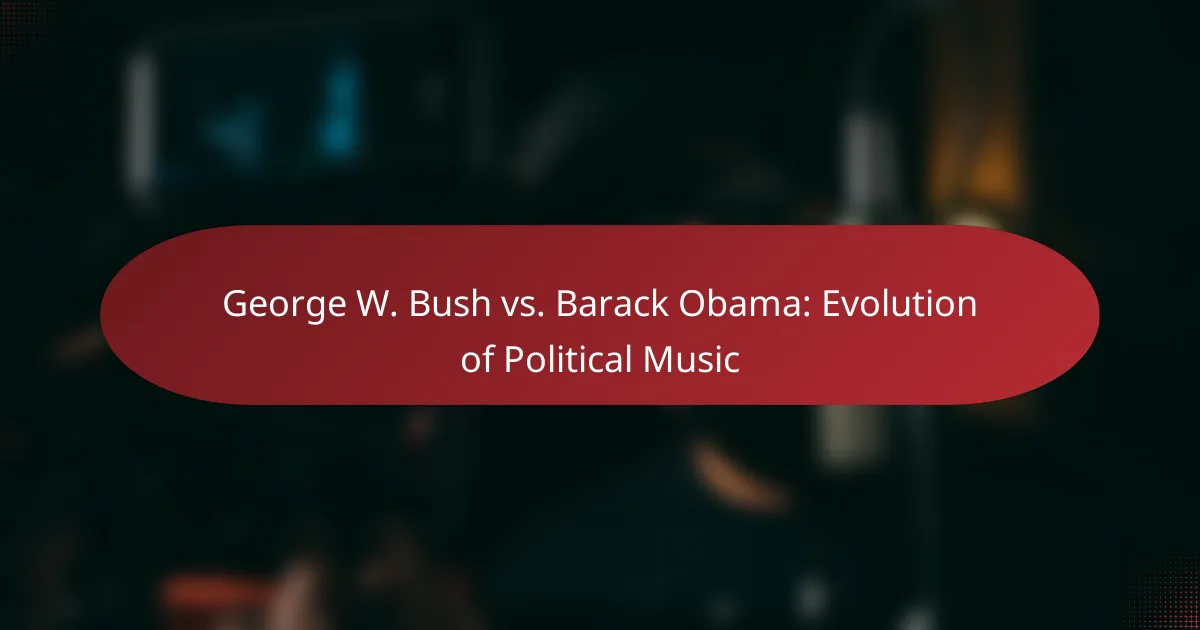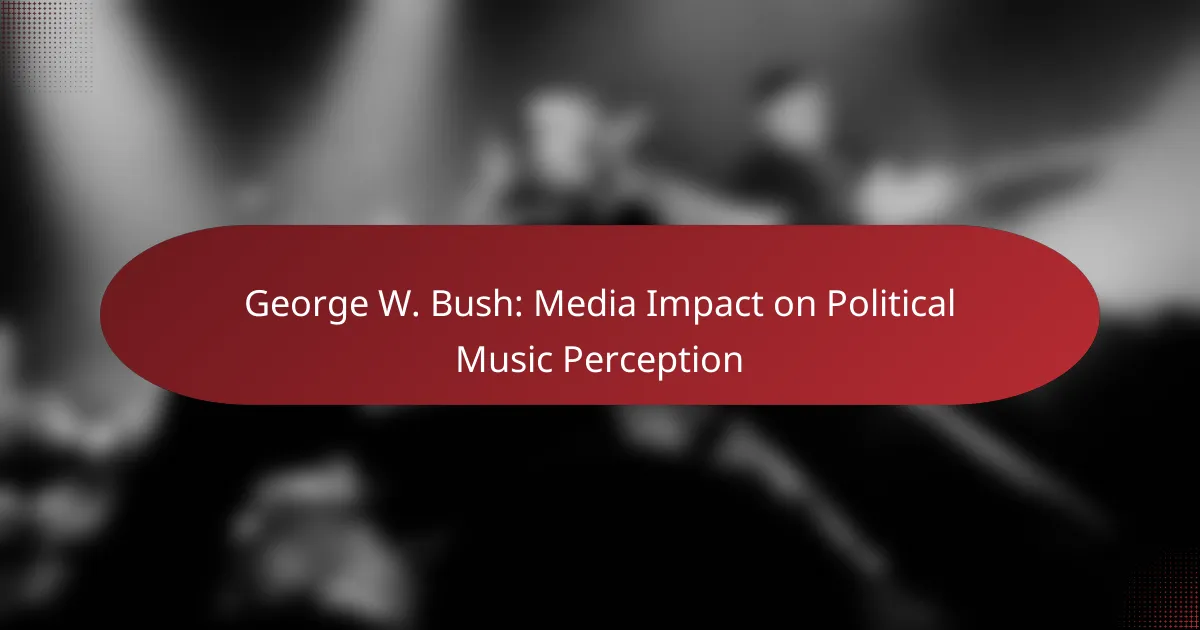George W. Bush’s music, rooted in country and classic rock, showcases a personal and accessible style that stands in contrast to the more polished works of other political figures. His songs often explore themes of patriotism and personal storytelling, reflecting his identity and connection to American values, while other politicians may embrace a wider array of genres and themes in their musical expressions.
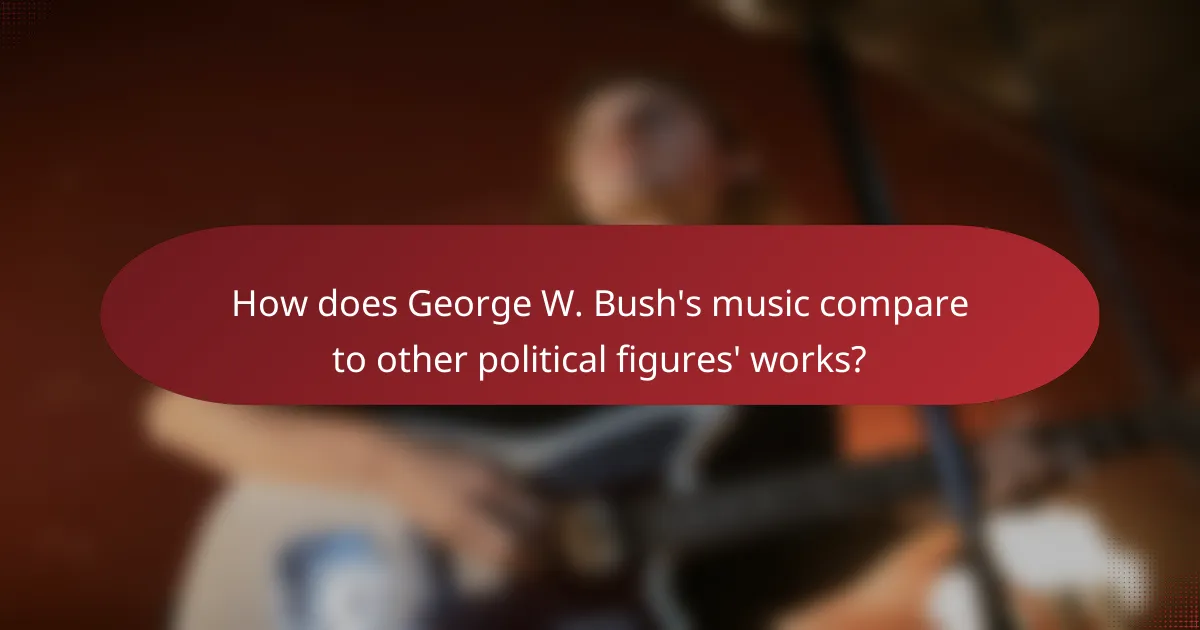
How does George W. Bush’s music compare to other political figures’ works?
George W. Bush’s music, primarily characterized by his love for country and classic rock, reflects a personal and accessible style that contrasts with the more polished productions of some other political figures. While Bush’s musical endeavors often focus on themes of Americana and personal storytelling, other politicians may lean towards more diverse genres and broader themes.
Bush’s musical style and themes
George W. Bush’s musical style is rooted in country and classic rock, showcasing his affinity for artists like Willie Nelson and the Eagles. His songs often emphasize themes of patriotism, personal reflection, and the American experience, which resonate with many of his supporters.
Bush’s approach to music is informal and relatable, often featuring simple melodies and lyrics that tell stories about everyday life. This style contrasts with more complex musical compositions found in the works of some other political figures.
Comparison with Barack Obama’s music
Barack Obama’s musical tastes are notably diverse, encompassing genres such as hip-hop, R&B, and classic rock. His playlists often include contemporary artists, reflecting a modern cultural landscape, while Bush’s selections lean more towards traditional Americana.
Obama’s music choices often convey messages of hope and change, aligning with his political themes. In contrast, Bush’s music tends to focus on nostalgia and personal narratives, creating a distinct difference in their musical expressions.
Comparison with Bill Clinton’s music
Bill Clinton is known for his love of jazz and blues, which he often showcased during his presidency. This musical preference highlights a sophisticated and cultural approach, differing from Bush’s straightforward country style.
While Clinton’s musical selections often included artists like Louis Armstrong and B.B. King, Bush’s focus remains on country music and classic rock, emphasizing a more traditional American sound. This difference reflects their distinct political identities and personal tastes.
Comparison with Ronald Reagan’s music
Ronald Reagan’s musical preferences included big band and traditional American music, which aligned with his image as a classic American figure. Like Bush, Reagan’s musical choices were rooted in nostalgia, but his selections often featured orchestral arrangements.
In contrast to Bush’s more casual country style, Reagan’s musical taste conveyed a sense of grandeur and historical significance. Both presidents used music to connect with American values, yet their styles and themes reveal different aspects of their political personas.
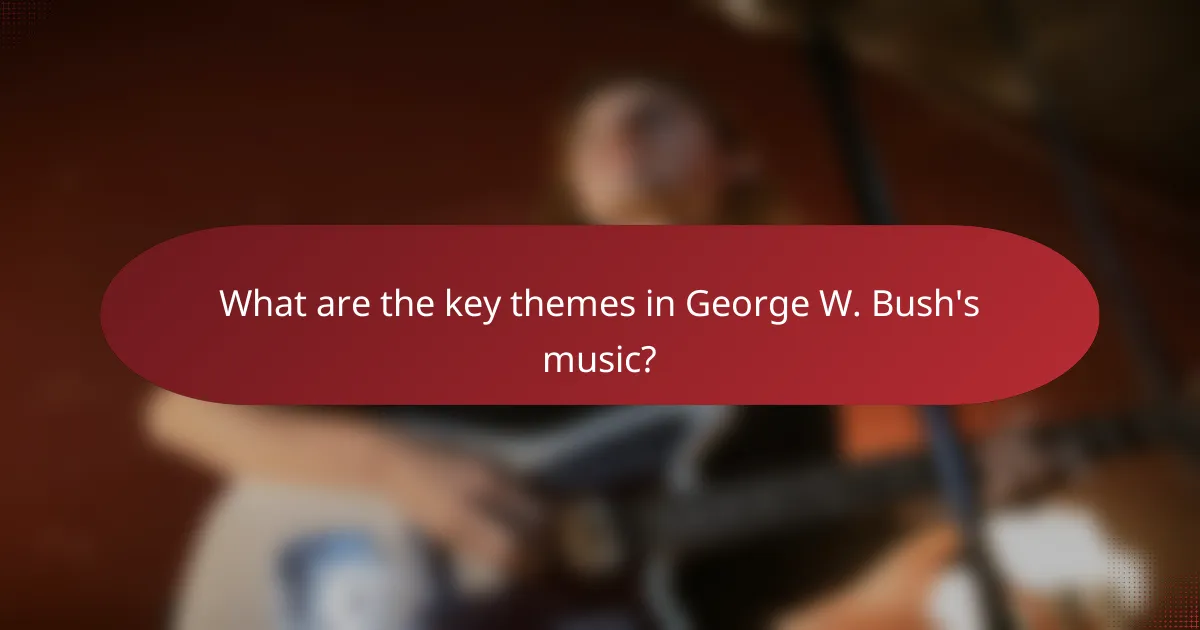
What are the key themes in George W. Bush’s music?
George W. Bush’s music primarily revolves around themes of patriotism, personal experiences, and reflections on his life and presidency. These themes resonate with his identity as a former president and his connection to American values.
Patriotism and American values
Patriotism is a central theme in George W. Bush’s music, often reflecting a deep love for the United States. His songs frequently celebrate national pride, military service, and the sacrifices made by Americans throughout history.
For example, Bush’s music may evoke imagery of iconic American symbols, such as the flag or the national anthem, reinforcing a sense of unity and shared values. This approach aligns with his political rhetoric during his presidency, where he emphasized the importance of national identity and resilience.
Personal experiences and reflections
Bush’s music also delves into his personal experiences, offering insights into his life beyond politics. He often shares stories from his upbringing, family, and the challenges he faced during his presidency, which adds a relatable dimension to his work.
Through his songs, listeners can gain a glimpse into his thoughts and feelings during significant moments, such as the aftermath of 9/11 or his time in office. This personal touch helps to humanize him, allowing audiences to connect with his journey on a deeper level.
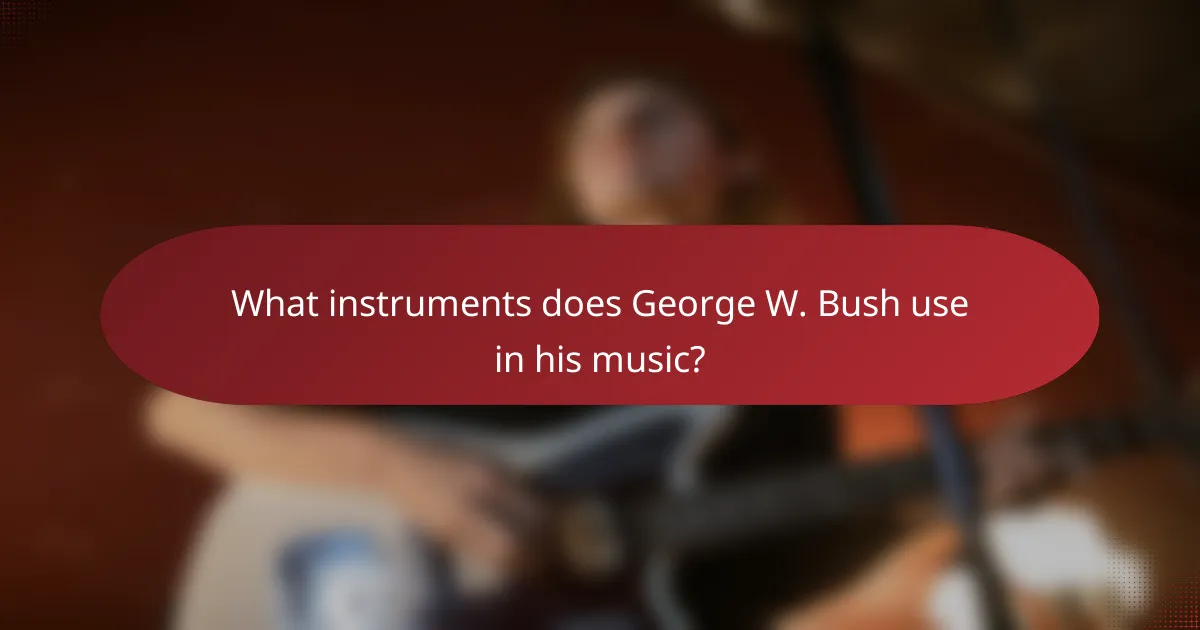
What instruments does George W. Bush use in his music?
George W. Bush primarily uses the guitar and piano in his musical endeavors. These instruments reflect his personal style and have played significant roles in his performances and compositions.
Guitar as a primary instrument
The guitar is George W. Bush’s main instrument, showcasing his affinity for rock and country music. He often plays acoustic guitar, which allows for a more intimate sound during performances, whether at private gatherings or public events.
Bush’s guitar playing is characterized by simple chord progressions, making it accessible for both him and his audience. This straightforward approach resonates well with fans who appreciate the authenticity of his musical expression.
Piano contributions
In addition to the guitar, George W. Bush also plays the piano, though less frequently. His piano work often complements his guitar performances, adding depth and a melodic layer to his music.
Bush’s piano contributions typically feature basic melodies and harmonies, reflecting his overall musical style. This versatility allows him to engage with different musical genres while maintaining a personal touch in his compositions.
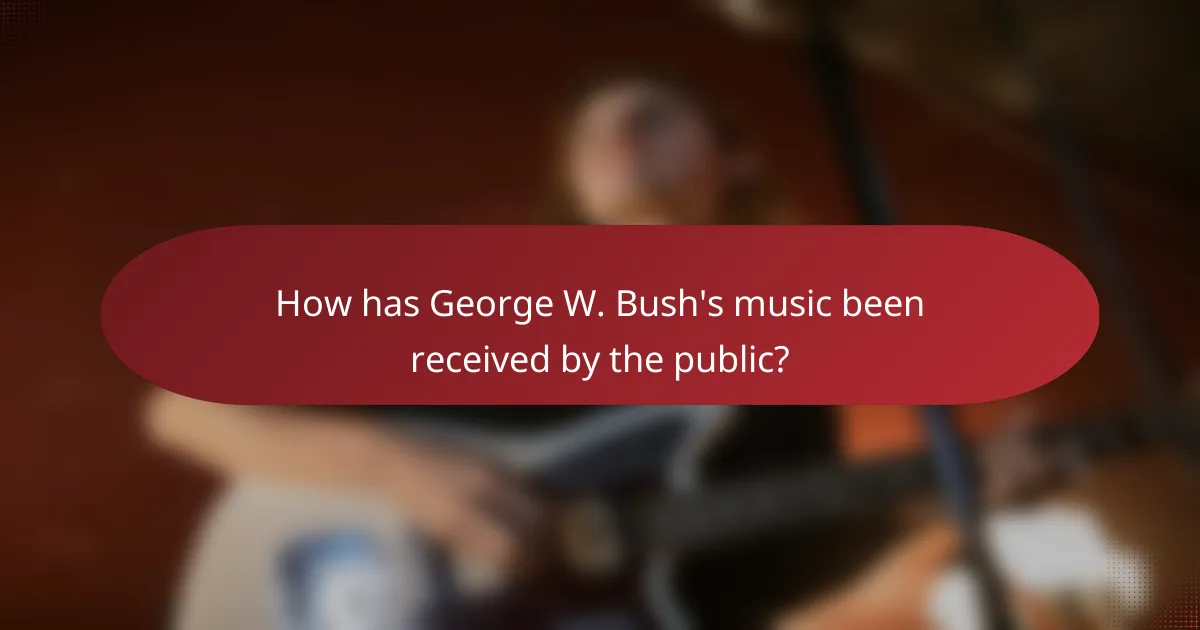
How has George W. Bush’s music been received by the public?
George W. Bush’s music has garnered a mixed reception from the public, with some appreciating his artistic endeavors while others critique them. His foray into music, particularly his guitar playing and songwriting, has been viewed as a personal expression rather than a professional pursuit.
Critical acclaim and reviews
Critical reviews of George W. Bush’s music have been largely varied. While some music critics acknowledge his genuine passion for music, they often highlight a lack of technical proficiency and songwriting depth. Reviews typically emphasize the novelty of a former president engaging in music rather than the quality of the music itself.
Notable publications have described his work as charming yet simplistic, often comparing it unfavorably to the output of professional musicians. This has led to a perception that his music is more of a hobby than a serious artistic endeavor.
Public popularity and sales
Public popularity for George W. Bush’s music remains limited, with sales figures reflecting a niche interest rather than widespread acclaim. His albums, while available, have not achieved significant commercial success, often selling in the low tens of thousands of copies.
Fans of his music tend to appreciate the personal stories behind his songs, but overall, his musical contributions have not resonated broadly with the general public. This contrasts sharply with other political figures who have successfully transitioned into music, highlighting the unique challenges Bush faces in this artistic realm.
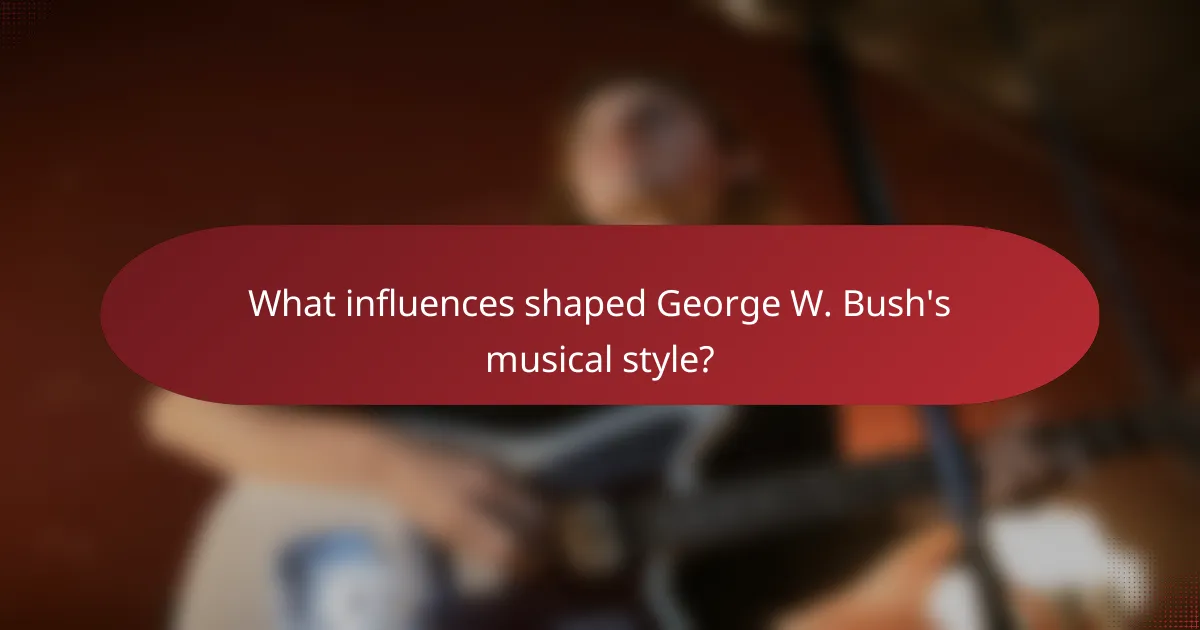
What influences shaped George W. Bush’s musical style?
George W. Bush’s musical style is primarily influenced by country music and his deep Texas roots. These elements reflect his personal experiences and the cultural backdrop of his upbringing, which shaped his musical preferences and public persona.
Country music influences
Country music plays a significant role in George W. Bush’s musical style, reflecting themes of patriotism, love, and everyday life. Artists like Willie Nelson and George Strait resonate with him, showcasing a blend of traditional sounds and storytelling that appeals to his values. Bush often expressed admiration for country music’s ability to connect with audiences on a personal level.
His affinity for country music is evident in his public appearances and events, where he frequently featured country artists. This genre’s straightforward lyrics and melodies align with his straightforward communication style, making it a natural fit for his musical tastes.
Texas roots and culture
Growing up in Texas, George W. Bush was immersed in the state’s rich musical heritage, which includes country, blues, and folk influences. This cultural background shaped his appreciation for music that tells a story and evokes strong emotions. The Texas spirit of resilience and community is often reflected in the songs he enjoys.
Bush’s Texas roots also influence his choice of music for public events, often favoring artists who embody the state’s values. This connection to his home state not only defines his musical preferences but also reinforces his identity as a Texan leader, resonating with many Americans who share similar cultural ties.
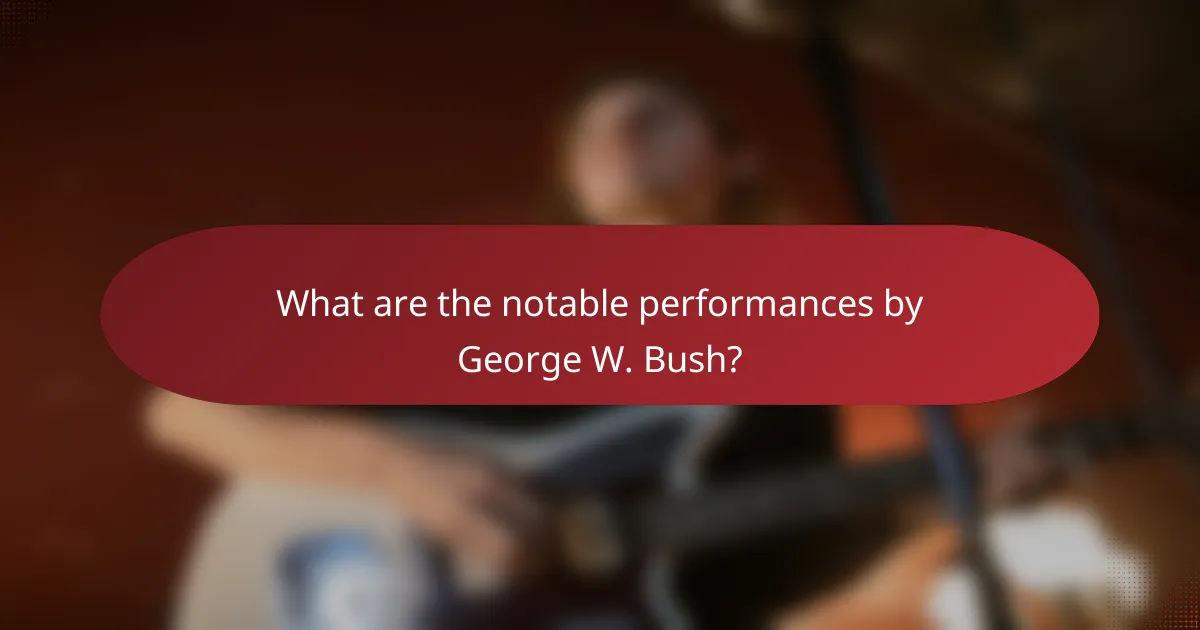
What are the notable performances by George W. Bush?
George W. Bush is known for several notable musical performances, particularly during his presidency. His appearances often included singing and playing guitar, showcasing his passion for music and connecting with audiences at various events.
Live performances at political events
George W. Bush participated in live performances at various political events, often using music to engage with supporters. One of his memorable moments was performing “La Bamba” at a fundraiser in 2001, which highlighted his willingness to entertain and connect with the public. Such performances were typically light-hearted and aimed at fostering a sense of camaraderie among attendees.
In addition to fundraising events, Bush occasionally played at informal gatherings, including White House parties. These performances often featured classic rock and country songs, reflecting his personal musical tastes and the cultural backdrop of his presidency.
Collaborations with other artists
While George W. Bush did not have extensive musical collaborations, he did share the stage with notable artists during various events. For instance, he performed alongside country music stars at charity events, blending his political presence with popular culture. These collaborations often aimed to raise funds for causes like education and disaster relief.
Bush’s interactions with musicians were generally supportive, as he expressed admiration for their work. His presence at events featuring artists like Toby Keith and others helped bridge the gap between politics and entertainment, showcasing his ability to connect with diverse audiences.
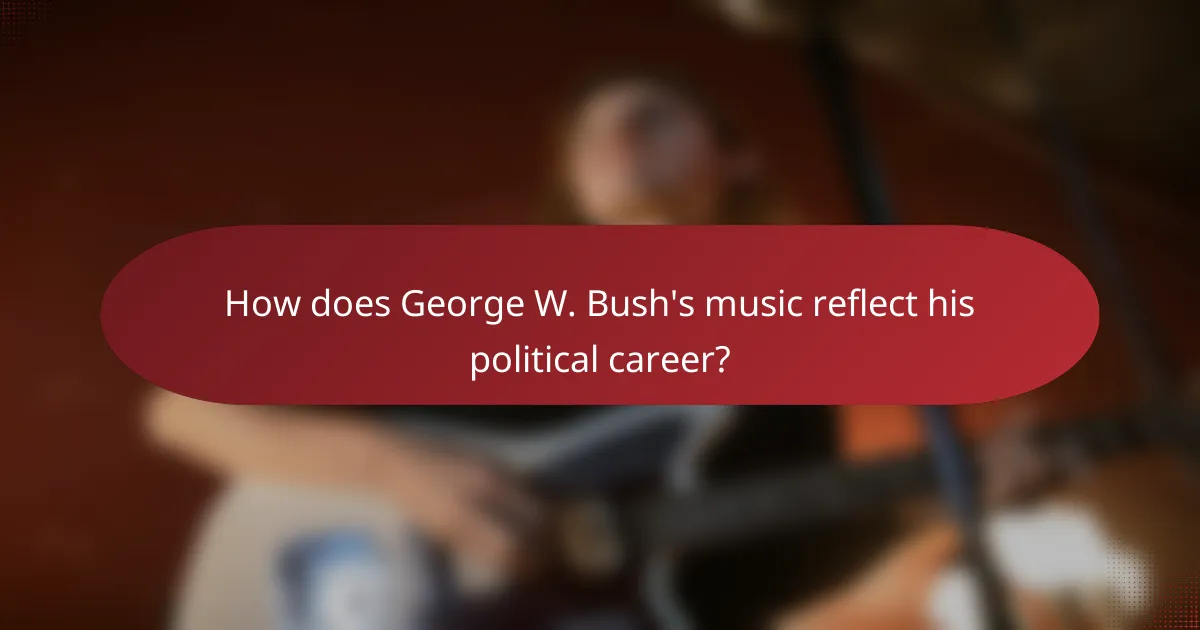
How does George W. Bush’s music reflect his political career?
George W. Bush’s music often mirrors his political career through themes of patriotism, resilience, and personal connection. His choice of songs and performances during significant events highlight his values and the sentiments of the American public during his presidency.
Music as a tool for connection
Music served as a bridge between George W. Bush and the American people, particularly during times of national crisis. For instance, his performances at events like the 2001 inauguration and post-9/11 memorials aimed to unify citizens and instill a sense of hope. By selecting songs that resonated with the public, he fostered a communal spirit and emotional solidarity.
Additionally, Bush’s love for country music, exemplified by his performances with artists like Toby Keith, reinforced his image as a relatable leader. These musical choices helped him connect with a broad audience, especially in conservative and rural areas where country music is particularly popular.
Reflection of his presidency
The music associated with George W. Bush’s presidency often reflected the political climate and challenges of the time. Songs that emphasized themes of strength and perseverance were prevalent, particularly in the wake of the September 11 attacks. This selection of music underscored his administration’s focus on national security and resilience.
Moreover, Bush’s musical engagements, such as his guitar performances, symbolized a more personal side of his leadership. These moments allowed him to convey his emotions and values, making his presidency more relatable to the public. The music he embraced often mirrored the sentiments of his supporters, reinforcing his political narrative during his two terms in office.
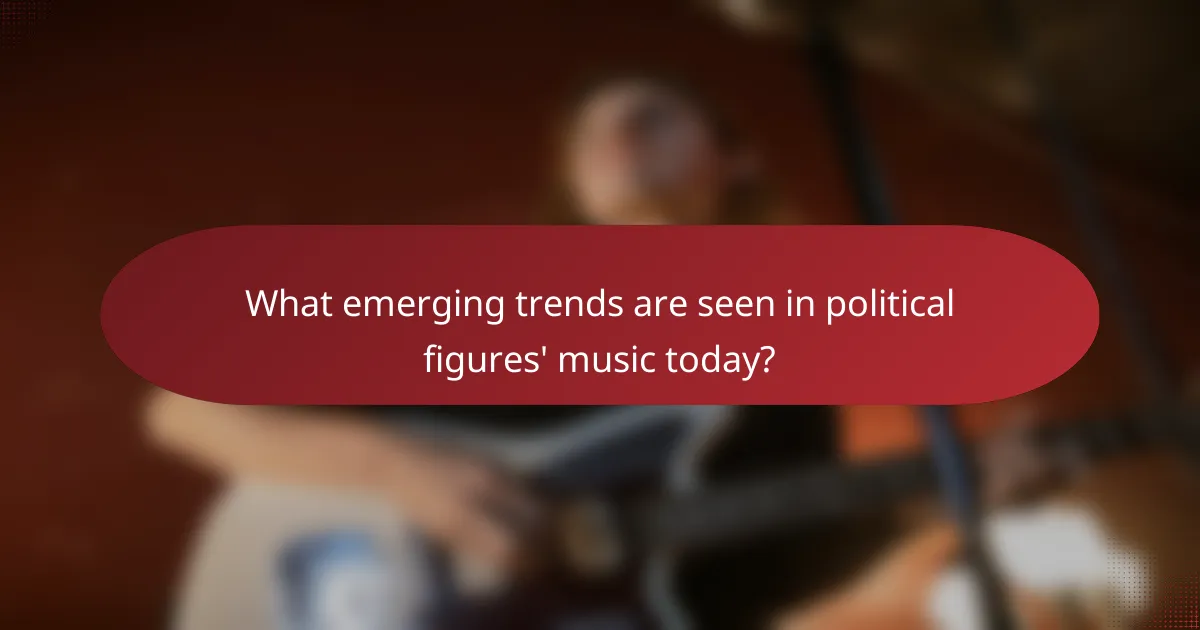
What emerging trends are seen in political figures’ music today?
Political figures are increasingly using music as a tool for engagement and expression, often reflecting contemporary social issues. This trend includes collaborations with popular artists and the incorporation of diverse musical styles to resonate with broader audiences.
Increased Collaboration with Artists
Many political figures are partnering with well-known musicians to amplify their messages. This collaboration often involves creating campaign songs or participating in benefit concerts, which can enhance their visibility and relatability. For instance, during election cycles, candidates may feature popular artists at rallies to attract younger voters.
Diverse Musical Genres
Political music is no longer confined to traditional genres like folk or protest songs. Today, figures are embracing a variety of styles, including hip-hop, pop, and country, to connect with different demographics. This shift allows politicians to reach a wider audience and address issues in a more culturally relevant manner.
Focus on Social Issues
Current political music often highlights pressing social issues such as climate change, racial equality, and healthcare. Artists and politicians alike use their platforms to raise awareness and inspire action, making music a powerful medium for advocacy. Campaigns may incorporate songs that directly address these themes, resonating with constituents’ values and concerns.



